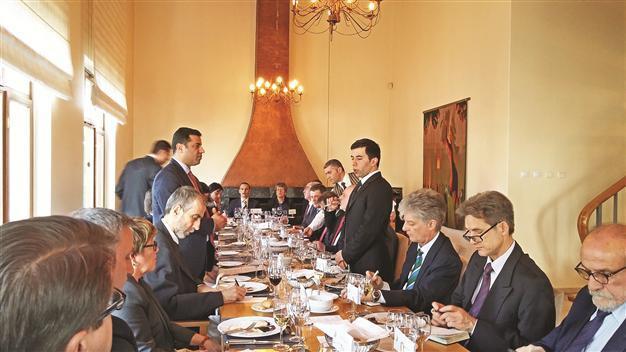EU urges HDP not to take risks in upcoming polls
Serkan Demirtaş

Peoples’ Democratic Party (HDP) co-chair Selahattin Demirtaş (L, standing) is seen during a lunch in Ankara with the envoys of European Union member states.
On June 7, 2015, some 54 million Turkish people will cast their votes to elect their parliamentary representative and to elect the new government. With less than five months to go, all political parties are slowly beginning to work for the polls, planning their election campaigns. The June elections will be the last of three consecutive elections that began with local elections in March last year, followed by presidential elections in August. For many, the June elections are very critical, marking the start of a new era in Turkey.
But before making political forecasts for the post-election term, there is a more urgent issue preoccupying Turkey’s political parties, and even other countries: Will the pro-Kurdish Peoples’ Democratic Party (HDP) run for parliament as a political party or as independent candidates? HDP officials have openly declared their intention to run for parliament as a party, confident that they will pass the 10 percent national election threshold.
Supporting this argument, many cite co-chairman Selahattin Demirtaş’s success in last year’s presidential elections, in which he received 9.6 percent of the vote - the highest vote share a Kurdish politician has ever received. The HDP’s prominent figures explain their decision to take part in the election as a party by underlining that they are rapidly becoming a party addressing the whole of Turkey, not just exclusively an ethnic identity.
However, public opinion polls show the opposite. The HDP still appears far below the 10 percent threshold, prompting a debate that is also engulfing other parties, particularly the ruling Justice and Development Party (AKP). However, this debate also has ramifications abroad, especially in European Union countries that are concerned about the HDP’s decision.
This week witnessed important meetings in Ankara, with Selahattin Demirtaş’s Jan. 29 get together with the ambassadors of EU countries topping the list. Demirtaş also held bilateral meetings with the envoys of prominent EU countries, in which the peace process and the HDP’s plans to enter the elections as a party were the main subjects.
According to my sources familiar with these talks, the EU ambassadors delivered a common message to Demirtaş: “It’s too risky to run for parliament as a party. For the sake of the peace process, it would be wiser to seek other ways to re-enter to parliament. The HDP’s presence in parliament is the best way to secure its legitimization, and this process should not be abandoned. In the event that the HDP remains below the threshold, the prospects of continuing meaningful talks to end the Kurdish question will diminish.”
During the lunch meeting, some of ambassadors asked what the HDP would do if it was left out of parliament after the election. In a surprising answer, Demirtaş re-emphasized his confidence that his party would pass the 10 percent threshold and claimed that it even had the potential to reach up to 14-15 percent of the vote. Demirtaş cited the following justifications for the HDP’s very important decision:
- To gain more visibility and “roots” for the HDP in the Turkish political context.
- To not give a competitive advantages to other parties in districts where the HDP is not represented.
- To obtain votes from electors abroad.
- To reach all minority groups and leftists who are currently not represented.
- Policies based only on ethnicity are not a winning solution for the Kurds.
Although Demirtaş was confident about the elections, he also said that being outside of parliament would not be the end of the world for the HDP. If it were to happen, he stressed that the party would still carry out the peace process negotiations, but he also expressed his dissatisfaction with the government’s current approach to the talks.
